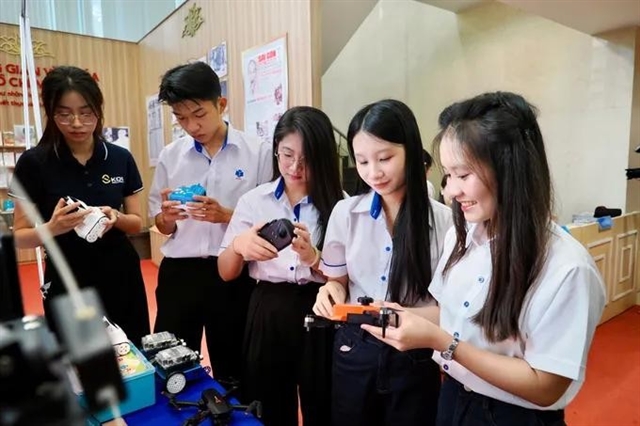Imagine a world where artificial intelligence (AI) not only enhances learning experiences but also upholds the values of fairness and equity in education. This vision was at the heart of a recent seminar in Ho Chi Minh City, where experts gathered to discuss the ethical considerations and social responsibilities of integrating AI into education. Their insights align with Vietnam's strategic goals for digital transformation in this vital sector.
Building AI Literacy and Teacher Training
One of the key measures proposed by the experts is the development of AI literacy programs. These initiatives aim to equip students and educators with the knowledge and skills needed to navigate the AI-driven educational landscape effectively. By fostering a deeper understanding of AI technologies, learners can better harness their potential while being mindful of ethical implications.
In addition to AI literacy, enhancing teacher training emerged as a crucial component. Teachers play a pivotal role in guiding students through their educational journeys, and empowering them with the right tools and knowledge is essential. With comprehensive training, educators can confidently integrate AI into their teaching practices, ensuring that it serves as a beneficial resource rather than a disruptive force.
Establishing an Ethics Framework
At the seminar, the importance of establishing a robust ethics framework was underscored. Such a framework would provide clear guidelines on the responsible use of AI in educational settings, safeguarding the interests of all stakeholders involved. This approach not only promotes transparency but also fosters trust among students, educators, and the broader community.
"Collaboration between the government, academia, and industry is essential to ensure AI serves humanity and promotes fairness in education," said one of the experts at the seminar.
Collaboration for a Fairer Future
The seminar highlighted the need for collaboration across various sectors to achieve these goals. By working together, the government, academic institutions, and industry leaders can create a cohesive strategy that leverages AI's potential while prioritizing ethical considerations. This collaborative effort is crucial to ensuring that AI not only enhances educational outcomes but also contributes to a more equitable and inclusive society.
As we stand on the brink of a new era in education, the call for ethics and social responsibility in applying AI is more important than ever. By embracing these principles, we can create a learning environment where every student has the opportunity to thrive, guided by the values of fairness and integrity.
Originally published at https://vietnamnews.vn/society/1728333/experts-stress-ethics-social-responsibility-in-applying-ai-to-education.html
ResearchWize Editorial Insight
The article "AI in Education: A Call for Ethics and Social Responsibility" is a beacon for both students and researchers, illuminating the path toward a future where technology and humanity harmoniously coexist in educational settings. This piece is particularly significant because it addresses the pressing need for ethical considerations as AI becomes increasingly integrated into classrooms.
For students, the article highlights the importance of AI literacy, which is akin to learning a new language that will soon be essential in navigating the world. By understanding AI, students can become active participants in their learning journeys, rather than passive recipients of technology-driven education. This empowerment is crucial for fostering a sense of agency and responsibility in young learners.
For teachers, the emphasis on enhanced training underscores a vital shift in educational paradigms. Teachers are the linchpins of educational transformation, and equipping them with AI tools and ethical guidelines ensures that they can guide students effectively. This support helps teachers feel confident and competent in their roles, allowing them to focus on nurturing each student's potential.
The call for an ethics framework is a reminder that technology should not overshadow human values. Researchers in education technology can take this as a cue to prioritize studies that explore the intersection of AI and ethics, ensuring that innovations serve to uplift rather than marginalize.
Finally, the article's emphasis on collaboration across sectors is a clarion call for a united front in educational reform. By working together, stakeholders can ensure that AI's integration into education is not only innovative but also equitable and inclusive. This collective effort can pave the way for a future where every student, regardless of background, has the opportunity to thrive in a learning environment that respects and upholds the values of fairness and integrity.
Looking Ahead
Inclusion acts as the sunlight, reaching every corner of the garden, ensuring that no learner is left in the shadows. AI tools can be designed to accommodate diverse needs, providing personalized pathways that illuminate each student's unique potential. By embracing diversity, education becomes a tapestry of varied voices and perspectives, each contributing to a richer understanding of the world.
The emotional side of schooling is the gentle rain that nurtures growth, reminding us that education is not just about facts and figures, but also about feelings and connections. AI can support this by offering tools that help students manage stress and build resilience, creating a learning environment that values emotional well-being as much as academic achievement.
To cultivate this future, we must focus on actionable steps that empower educators and learners alike. Teachers, equipped with AI literacy and ethical guidelines, become the skilled gardeners who guide this growth, ensuring that technology serves as a tool for empowerment rather than an obstacle. By fostering collaboration between educators, students, and AI developers, we can create an educational landscape where every learner has the opportunity to flourish.
As we look to the future, let us nurture this garden of education with care, ensuring that it grows into a place where fairness, inclusion, and emotional well-being are as abundant as the knowledge it yields.
Originally reported by https://vietnamnews.vn/society/1728333/experts-stress-ethics-social-responsibility-in-applying-ai-to-education.html.
Related Articles
- How is ChatGPT impacting schools, really? Stanford researchers aim to find out
- IU provides AI resources for students, faculty. Here’s what university experts think:
- Our latest commitments in AI and learning
📌 Take the Next Step with ResearchWize
Want to supercharge your studying with AI? Install the ResearchWize browser extension today and unlock powerful tools for summaries, citations, and research organization.
Not sure yet? Learn more about how ResearchWize helps students succeed.

